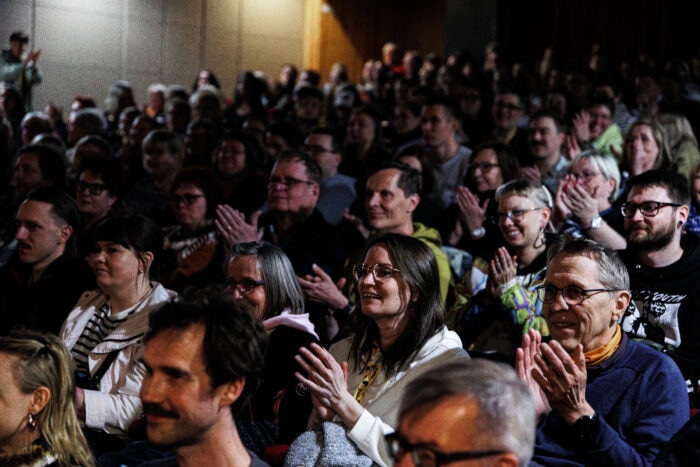The festival’s second day began with the traditional morning discussion with Julien Temple, the legendary director who began his career during the late 1970s. Temple chatted about his career with the British music scene, meetings with the Sex Pistols and The Clash, and the production of music videos. The director also shared his memory of how his relationship to films has shifted during the past years.
After the morning discussion the day continued in Cinema Lapinsuu with Robert Bresson’s A Gentle Woman (1969). Dominique Sanda, a special guest of this year’s festival, was also present in the screening and answered the audience’s and interviewer’s questions, such as a question of Bresson’s methods during the production.
Another special guest, Chris Petit, was also interviewed after the screening of his The Cardinal and the Corpse (1992) and Asylum (2000).
During Thursday, a series of highlights, the master classes took off with the Russian film critic Andrei Plahov’s choice Battleship Potemkin (1925), celebrating its 100th anniversary year. In turn, the familiar face of the festival, Olaf Möller, started his series of the master classes with Dead End Drive-In (1986).
The reveal of the Finnish surprise preview film was another peak within Thursday’s schedule. In the crammed Lapinsuu, Lauri-Matti Parppei’s feature length debut, selected for the Cannes festival as well, A Light That Never Goes Out (2025) electrified the atmosphere and roused the audience to elated applause. Rauma, Parppei’s childhood hometown, is also the milieu of the film. The dialogue is in Rauma dialect.
After the screening Parppei told how it was very different to see the film in Sodankylä, than it was to watch at Cannes. “The film was edited in Norway, and mostly its audience so far has consisted of people who do not understand a word of Finnish, not to mention the dialect of Rauma. It was very enjoyable – and very different, too – to experience the film here”.
The long line crossed and curled on the school yard, when the festival guests waited for the entrance to the first karaoke screening of the 40th anniversary year’s festival. The film encouraging the joint chanting was James Mangold’s A Complete Unknown (2024), narrating the dashing rise of the music legend Bob Dylan in the 60’s. The singalongs were led by Olavi Uusivirta with Dylan’s parts, and Aino Torttila with Joan Baez’s lyrics.
Later on during the evening the Big Tent filled up quickly with its audience, when Rosso (1985) by Mika Kaurismäki was to be screened. The audience was delighted when Kaurismäki and the lead actor Kari Väänänen told how the film was shot on surplus film left from prior projects, so the method of filming was rather improvisatory – yet every scene had to succeed with the first shot! Collective singing accompanied the scene, where Väänänen and the other lead, Martti Syrjä, belt out their interpretation of the evergreen ‘Olen suomalainen – L’italiano’.
In the red tent the pioneer of the Greek Weird Wave and film director, Athina Rachel Tsangari introduced her film Harvest (2004). The film, based on the novel carrying the same name, follows the villagers who are fighting for their existence, but gets carried away with xenophobia and violence, ultimately sealing their very own annihilation. Tsangari explained how she affectionate towards the weak and cowardly antiheroes.
The film shot on the Scottish moors is lit mostly with the natural daylight. Tsangari wanted the film’s scenes to be physical and dance-like, and therefore a major part of the original dialogue of the screenwriting was eventually left unused.
Léonor Serraille, another special guest of the Festival, arrived straight from the airport to the screening of Montparnasse Bienvenüe (2017), accompanied by booming applauds. Serraille was just in time to answer the questions of the Q&A discussion that followed the screening.
In the evening at the Club Tent the genre-bending and breaking Pietarin Spektaakkeli lifted the mood even higher, and the tent, despite its size, was yet again proved to be worthy of its name.
During the festival day of Thursday films were screened and loved in cold air, though the sun glared bright.
